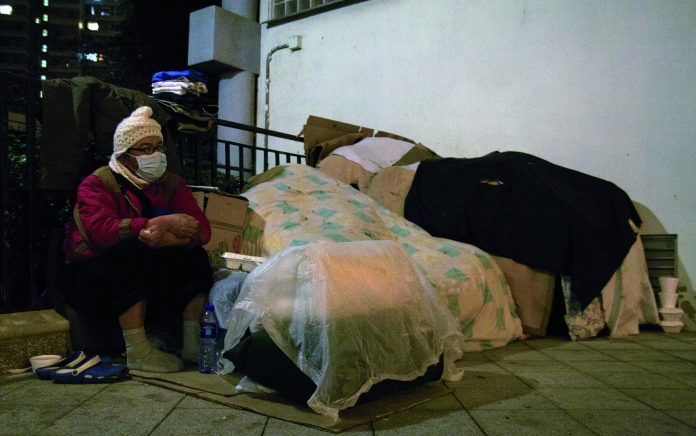High rents push working people onto the streets
By Stanley Lam & Chloe Kwan
The area under the flyover next to Sham Shui Po is home to a shifting population of street sleepers, whose makeshift homes mark an ironic contrast to the private high-rise residential buildings just a block away.
When people think of the homeless, they often conjure up images of the marginalised, the mentally ill and those who are addicted to drugs. But there are many reasons people may live on the streets and some are members of the working poor who simply cannot afford to find a place to live.
“I’m still searching for a home but the rent is too high,” says Ah Ji, a street sleeper in his 40s, sitting calmly in Tung Chau Street Park on the coldest day so far of the winter.
When Varsity visited him, Ah Ji , who does not want to disclose his full name, had been sleeping in the park for a year. He used to rent a bed space in an old walk-up tenement building in Ki Lung Street, a few blocks away from where he now sleeps. Ah Ji says he paid HK$1,200 a month for a bed space in the flea-ridden apartment, where the lights only intermittently worked. When the landlord decided to turn the flat into sub-divided units, Ah Ji moved out and has been unable to find affordable accommodation elsewhere.
“I’m saving money, hoping the amount can sustain housing rents at least for a few months,” he says with hope and confidence. Ah Ji is a casual renovation worker who only works when he receives calls from his foreman. He is neither reluctant to work nor unable to work, despite what some might think, and he is not alone among street sleepers.
According to the survey report of the Homeless Outreach Population Estimation Hong Kong 2015 conducted by local universities and community organisations, 35 per cent of street sleepers interviewed had jobs, and nearly half said they sleep on the streets because due to unaffordable rents.
Like Ah Ji, most of the working homeless are casual workers. Although they can meet their immediate need for food and daily necessities getting paid by the day, this is not a practical way of maintaining their livelihood. Employers always ask job applicants to fill in their addresses and contact numbers when they apply for long-term employment. Ah Ji says the homeless are trapped in the vicious cycle of“no address, no job”, which makes it hard for them to find long-term jobs with stable incomes.
Without either, Ah Ji has tried staying in two street sleepers’ hostels founded by a charity in Sham Shui Po and Yau Ma Tei. But he found it hard to follow the hostel rules.
“We need to follow their rules strictly, for instance, the time of sleeping and waking up,” Ah Ji explains. The time constraints are disruptive to the working homeless because they might not be able to get back in time after finishing work.
While they acknowledge the rules are reasonable, they are inconvenient for some working homeless people. But there are others who choose the street over shelter in a hostel because they prefer the freedom of the streets.







































